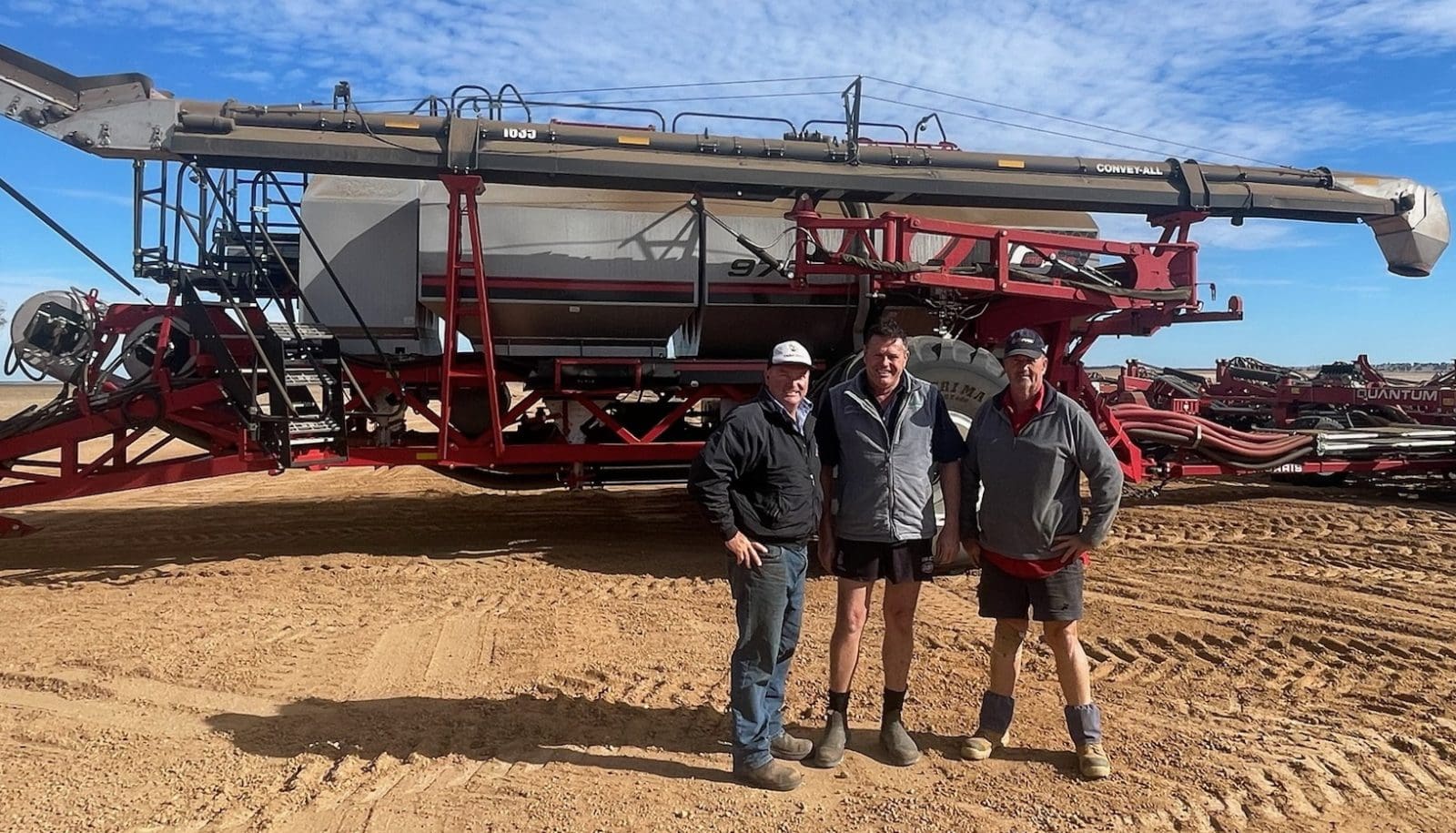
Rod Messina, Anthony Farrell and Ant Dreghorn pictured with the new Morris 10 Series air cart during seeding at the Messina family’s Spring Park Farms properties in the northern WA wheatbelt. Photo: McIntosh
IT’S been a tough start to the season for most Western Australian growers this year, including for the Messina family in WA’s northern wheatbelt, however the use of a new airseeder that helped to reduce their downtime and plant more hectares more accurately at least put a smile on their faces.
Brothers Rod and Drew Messina and their wives, Sam and Tracey, grow wheat, canola and lupins over about 16,000ha on their Spring Park Farms properties located from Mullewa across to Dongara; however, dry conditions prompted them to manage 3000ha as fallow this year.
The land comprises predominantly sandplain and some red loam soils, and, up until recent rainfall, only 28mm of rain at the end of February had been received on some of the farms, with some small rain events also reported on the coastal land.
The Messinas have plenty of experience with seeding systems and this season they took up the opportunity to test the recently released Morris 10 Series air cart.
They also have two John Deere air carts and drills and a Morris 9 Series air cart hitched to a disc seeder.
Rod Messina said the Morris 9 Series needed load cells and a small seeds box and with both items included on the 10 Series, it already was a benefit.
He said correct tank capacities to accommodate popular application rates of 70kg/ha of wheat and 100kg/ha of fertiliser also provided a significant boost to their seeding productivity.
The family typically uses these rates, along with 55 litres/ha of liquid nitrogen fertiliser.
“Both granular tanks are the same size on the 10 Series. It works out that we could complete 120ha from a fill, but we use slightly lower loads to do 100ha,” Rod said.
“However, with canola going in the small-seeds box, we can fill the main tanks with 25 tonnes of fertiliser and go for 200ha, depending on our seed rate.”
A fully integrated, stainless-steel liquid tank with the new Morris 10 Series is larger and Rod said they used the extra capacity to increase their liquid nitrogen rate up to 65L/ha.
“It’s certainly out in the paddock a lot longer with the canola; we can complete almost 300ha in a shift.”
“The conveyor used to fill the cart is quite amazing. It’s so fast to fill such a big cart – it’s unbelievable.”
The small seeds tank has been designed as a larger, dual-purpose Optimizer Tank, allowing the ability to optimise the capacities of the other main granular tanks, also with rate optimisation to ensure combined tanks empty at the same time.
Mr Messina said the load cells and associated automatic calibration correction, as well as the continuing section control, made the Morris 10 Series an obvious choice.
“With the app, you can also read the scales down at the truck and get your exact kilos for the hectares.”
“Fixing the variance between your calibrated rate and actual rate, and reducing your downtime, is important.
“We are absolutely close to our calibrated rates.
“We are now only putting in an extra 100 kilos and there might be 100 kilos leftover because the scales are so accurate.
“With input costs being so high, the rates you are putting out need to be accurate.”
The introduction of electric metering, which continues to use the renowned Morris spiral-fluted metering wheels and is powered by a brushless alternator and driven by brushless motors, assists the accurate application of low seeding rates.
“We generally sow canola at 1.2-1.4kg/ha. We measure every kilo of canola and it was extremely accurate,” Rod said.
After dry-sowing most of their program, the Morris 10 Series air cart and an accompanying 24-metre Morris Quantum air drill completed the Messina’s seeding program in moist conditions on a former sheep property they acquired.
“It was the only rig we used to seed the canola that started on April 24, and it did most of the program,” Rod said.
“The frame of the cart is very strong and robust, and it was working on deep-ripped country on the sheep farm and it floated over it with its big tyres.”
The frame incorporates the Morris Duraloc interlocking technology that has been carried through from the Quantum air drills, while the axle design has been tailored to suit the strong preference in Australia for large single tyres rather than duals.
Rod said they also were highly impressed with the 24m Quantum air drill, which suited their controlled traffic farming system.
“In particular, the flotation and trash flow were better than we expected.”
The Messina’s Quantum air drill also features automatic variable-pressure packing and lifting of tines at the end of runs, plus automatic end-of-row turning.
“The operator is pretty much able to sit back and watch it go to work.”
Distributed by McIntosh Distribution, the Morris 10 Series complements small and large frame air carts from the manufacturer’s 9 Series.
Growers have the choice of seven models from the 10 Series, offering capacities ranging from 20,890-34,701 litres in three and four-tank configurations.
Source: McIntosh

HAVE YOUR SAY